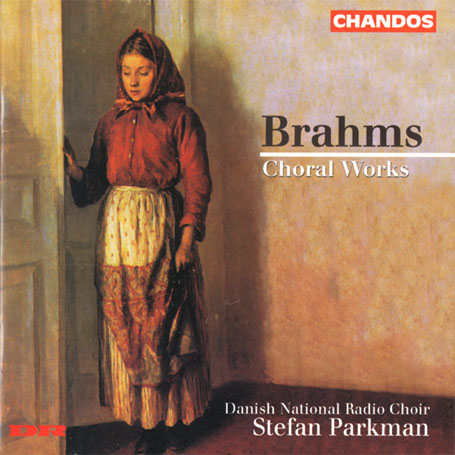Brahms Choral Works
Seductive playing and singing which nevertheless leaves something to be desired
View record and artist detailsRecord and Artist Details
Composer or Director: Johannes Brahms
Label: Chandos
Magazine Review Date: 9/2000
Media Format: CD or Download
Media Runtime: 68
Catalogue Number: CHAN9806

Tracks:
| Composition | Artist Credit |
|---|---|
| (4) Gesänge |
Johannes Brahms, Composer
Caitriona Yeats, Harp Danish National Radio Choir Johannes Brahms, Composer Leif Lind, Horn Per McClelland Jakobsen, Horn Stefan Parkman, Conductor |
| (3) Gesänge |
Johannes Brahms, Composer
Danish National Radio Choir Johannes Brahms, Composer Stefan Parkman, Conductor |
| (11) Zigeunerlieder |
Johannes Brahms, Composer
Bengt Forsberg, Piano Danish National Radio Choir Johannes Brahms, Composer Stefan Parkman, Conductor |
| (5) Gesänge |
Johannes Brahms, Composer
Danish National Radio Choir Johannes Brahms, Composer Stefan Parkman, Conductor |
| (6) Quartets |
Johannes Brahms, Composer
Bengt Forsberg, Piano Danish National Radio Choir Johannes Brahms, Composer Stefan Parkman, Conductor |
Author: John Steane
These pieces tempt performers and listeners into that gently purring mood which asks for nothing better than to be stroked by lovely sounds and a vague apprehension of romantic sentiment. Of course, in the gypsy songs the stroking is more vigorous and the purring less sleepy; but in this recital the singing is so beautiful, the accompaniments so well played, and the music itself so warmly accommodating, that it takes an effort of will to get up from its lap and trudge out into the cold to find material for comparison. Even now the temptation holds, and I’m inclined to think ‘Why bother?’. This is perfectly lovely, so why not leave oneself and one’s readers in blissful contentment, if also in relative ignorance? The answer comes with the RIAS Choir under Marcus Creed, the Monteverdi under Gardiner, and would come perhaps still more clearly from the Arnold Schoenberg Choir under Erwin Ortner on Teldec (nla).
These are not songs without words. The Danish Choir makes me content with beautiful sound and sensitive shading; it stimulates minimal curiosity about specific verbal meaning. In this respect the German choirs inspire much more interest, Gardiner’s English singers possibly more still. It is not entirely the fault of the singers in the new recording, in which they sound to be just a few vital steps more remote and, in the accompanied numbers, the instruments seem relatively a step or two nearer. Curiously, there was an element of this complaint-by-comparison in my review some years ago of the earlier RIAS disc (with Opp 17, 42 and 104), but then I came to the conclusion that this (the RIAS), with its beauty and feeling for ‘the gentler, more romantic qualities of the music’, was the most satisfying of the versions. Now, the new record, that bit gentler, throws the RIAS into relief in respect of its liveliness! Compare the Zigeunerlieder, for instance: the tone of voices and piano is sharper, the speeds are generally quicker, the rhythms more challenging. More of the gypsy in them, in fact.
So, with confidence of enjoyment if this is still the version of your choice, I respectfully suggest that perhaps it had better not be.'
These are not songs without words. The Danish Choir makes me content with beautiful sound and sensitive shading; it stimulates minimal curiosity about specific verbal meaning. In this respect the German choirs inspire much more interest, Gardiner’s English singers possibly more still. It is not entirely the fault of the singers in the new recording, in which they sound to be just a few vital steps more remote and, in the accompanied numbers, the instruments seem relatively a step or two nearer. Curiously, there was an element of this complaint-by-comparison in my review some years ago of the earlier RIAS disc (with Opp 17, 42 and 104), but then I came to the conclusion that this (the RIAS), with its beauty and feeling for ‘the gentler, more romantic qualities of the music’, was the most satisfying of the versions. Now, the new record, that bit gentler, throws the RIAS into relief in respect of its liveliness! Compare the Zigeunerlieder, for instance: the tone of voices and piano is sharper, the speeds are generally quicker, the rhythms more challenging. More of the gypsy in them, in fact.
So, with confidence of enjoyment if this is still the version of your choice, I respectfully suggest that perhaps it had better not be.'
Discover the world's largest classical music catalogue with Presto Music.

Gramophone Digital Club
- Digital Edition
- Digital Archive
- Reviews Database
- Full website access
From £8.75 / month
Subscribe
Gramophone Full Club
- Print Edition
- Digital Edition
- Digital Archive
- Reviews Database
- Full website access
From £11.00 / month
Subscribe
If you are a library, university or other organisation that would be interested in an institutional subscription to Gramophone please click here for further information.




